(By: Kanwal Krishan Lidhoo)*
There are lives that glow quietly, far away from the glare of recognition, yet leave behind a light that guides generations. Pandit Dina Nath Yaksh’s life was one such radiant flame. A man of extraordinary scholarship and rare missionary zeal, he embodied what Indian spiritual thought calls a Karamyogi—one who devotes every breath of his existence to a higher cause without seeking reward.
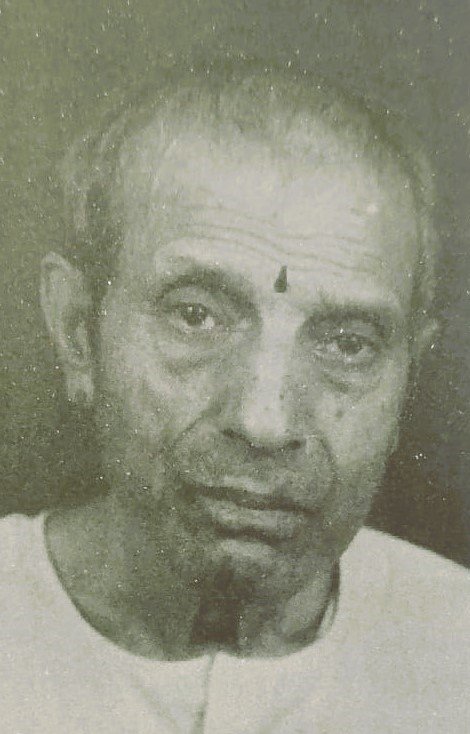
Yet, irony overshadows his legacy. Despite his monumental contribution, Pandit Yaksh remains a forgotten name in the annals of Indian scholarship. Newspapers barely acknowledged his passing. Thanks to a modest felicitation at Sanjeevani Sharda Kendra in Jammu at the fag-end of his life and a few humble homage columns after his demise, his life’s work went largely unnoticed. Only a handful of eminent scholars, such as Padma Shri Dr. Vishwamurti Shastri, truly recognised the immense debt Sanskrit studies owe to him.
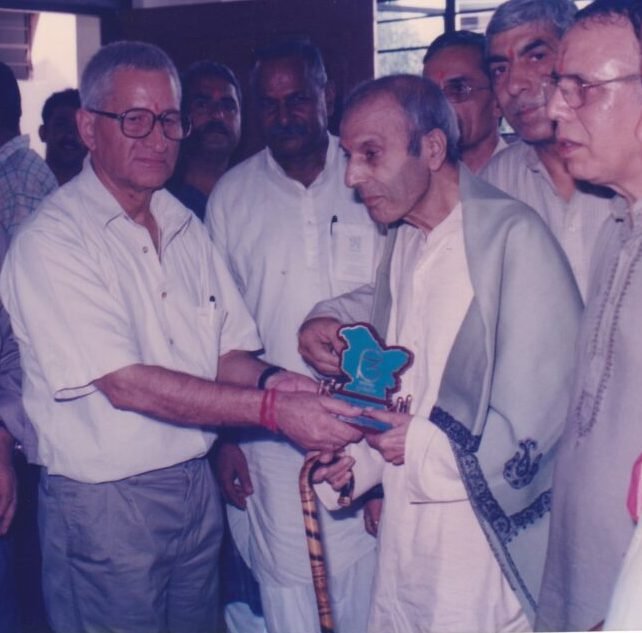
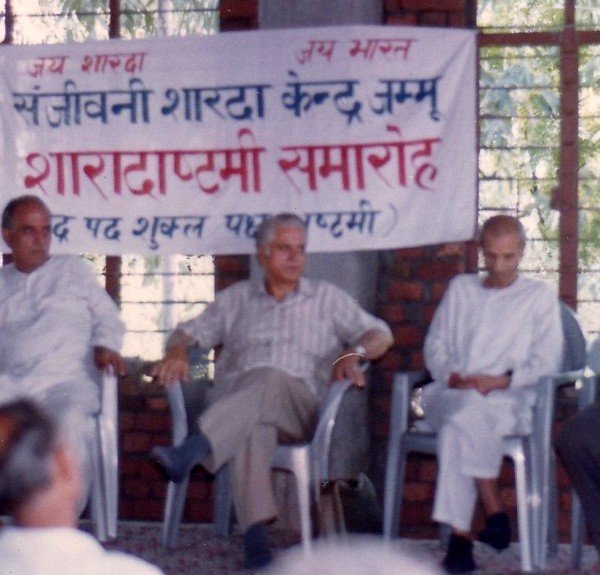
A Life Sacrificed for Knowledge
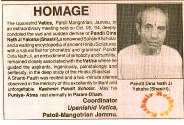
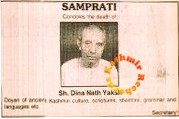
Pandit Yaksh lived for manuscripts. He pursued the recovery and preservation of rare texts with a zeal that bordered on the ascetic. It is said that he used money set aside for his daughter’s wedding to purchase ancient manuscripts, and at one point even pawned her jewellery to continue his mission. For him, Sanskrit was not just a language—it was a sacred trust that had to be saved, even at personal cost.
Today, countless researchers and scholars draw upon the rare archival treasures he rescued and catalogued. Many have built careers, written books, and earned fortunes using these texts. And yet, few have paused to acknowledge the man who made all this possible.
A Personal Glimpse of a Legend
This author had the rare fortune of visiting Pandit Yaksh at his modest Subash Nagar residence in Jammu, only months before his passing in 2004. Age and illness had left him frail, but his spirit remained unbroken. His ever-present smile, his humility and his eagerness to discuss Sanskrit and Kashmiri intellectual traditions left a deep impression. Even in the twilight of his life, he spoke not of hardship, but of the enormity of the mission he had undertaken—almost as if it were never his burden, but a duty handed down by destiny.
When he left this world on 4th October 2004, an era quietly came to a close. With him ended a tradition of unyielding dedication to Sanskrit’s shastric systems—a legacy that will take nothing less than a herculean effort to revive.
From Srinagar to Scholarship
Born in Srinagar on 12th June 1921, Pandit Dina Nath Yaksh’s intellectual journey began early. He attended Pathshalas and studied Karmakanda (ritual practices) and grammar under Pandit Ramjoo Kokiloo and Pandit Raghunath Kokiloo. His training in astrology came from Kashmir’s legendary Pandit Keshav Bhatt Jyotshi, while Pandit Parshuram Shastri and Pandit Kakaram Shastri of Jammu sharpened his command of Sanskrit grammar.
During his Shastri course at Punjab University, Lahore, he studied Nyaya (logic) and Kavya Shastra (poetics) under the guidance of Pandit Ananda Kak and Pandit Nathram Shastri. His thirst for knowledge was insatiable, and it prepared him for a life that would bridge Kashmir’s intellectual past with modern scholarship.
In 1945, he had joined the Jammu and Kashmir Research and Publication Department in Srinagar as a copyist. By the time he retired in 1976, he had risen to the position of Head-Pandit. But retirement never slowed him down. He went on to serve as Research Associate at the University of Kashmir’s Centre for Central Asian Studies, the Archaeological Department of J&K, and later the Rashtriya Sanskrit Sansthan, which honoured him with the prestigious Sastrachudamani fellowship.
Exile and the Final Chapter
Like countless other Kashmiri Pandits, Pandit Yaksh was forced to flee his beloved Kashmir in 1990, driven out by the violence of militancy. In the chaos of exile, he had to abandon his cherished personal library—one of the richest collections of manuscripts and texts painstakingly built over decades. Losing it was like losing a part of his soul.
And yet, he carried on with quiet dignity until the very end.
If Sanskrit scholarship thrives today, if researchers still discover the depths of Kashmir’s ancient traditions, it is because one man chose to sacrifice comfort, wealth, and recognition in service of a higher calling. Pandit Dina Nath Yaksh remains, in every sense, a forgotten Rishi of modern India.
*Kanwal Krishan Lidhoo, an accredited translator of Kashmiri, Urdu and Hindi by Sahitya Akademi New Delhi and Indian Institute of Languages Mysore, was associated with the institution of All India Radio (AIR) where he worked as a Senior Producer at Radio Kashmir Srinagar and Jammu. He is one of the Directors of Kashmir Rechords.
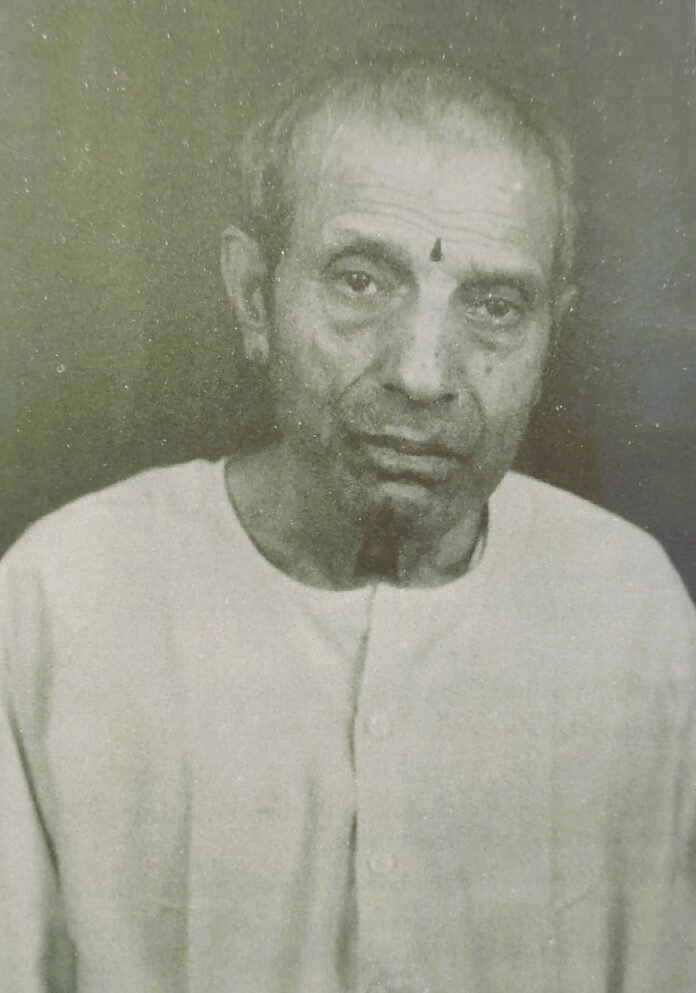
Remarkable contributions in preservation of Manuscripts and commanding role in promotion of Sanaskrit language and astrology.
Thanks for a response.
There r many such unsung heroes we hardly respect our legends who despite of limited resources preserved our ancient culture manuscripts history and rituals etc they were concerned about dharma and dedicated to the core and thus commanded respect though we always boast of ancestors of their wisdom courage and knowledge but practically put no efforts to carry forward their Misson only criticism may mata sharda bestow us with knowledge and wisdom remove all negative thoughts
Thanks Raina Saheb for the valuable inputs.
Kashmiri Pandits seem to have never been aware of their heroes around them. It’s with a pinch of salt that they have to accept that they are turning materialistic with each passing day. As if this was not enough those who are well endowed with resources and academic degrees refuse to come down from their high towers. And these are the people who grab the attention at the slight pretext and opportunity. They may be actual enemies of the community.